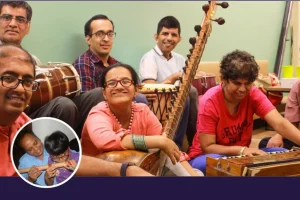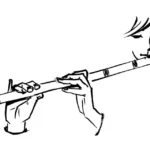We know that music makes you feel calm and relaxed. It has a unique effect on our heart rate as well as blood pressure, and makes us feel more relaxed by releasing happy hormones. Music can be a wonderful escape for you if you often suffer from stress and remain anxious. If you do feel stressed often, mastering a musical instrument can make a massive positive impact in your life.
The study of effects of music is called neuromusicology and it shows how the nervous system reacts to the brain. It has been found that music activates almost all parts of the brain. Brain scans of musicians and non musicians show that musicians have bigger, better connected, and more sensitive brains!
When you learn bansuri and play it, you are giving your brain a full workout. It specifically helps improve your mental performance and memory. There is evidence that music can help a patient’s brain recover from a stroke, dementia, and Alzheimer’s disease. If you are learning bansuri, you already experience some of these good effects. If you are curious about learning it, you should check out our online bansuri classes to get a taste of what I am explaining here.
Let’s look at three major parts of brain and how they are impacted by music:
The Motor Cortex
The motor cortex of the brain is responsible for managing voluntary movements. Most of its work is done in controlling our limbs. One of the most beautiful reactions to music in humans, irrespective of musical training, is tapping of the foot when we hear good music. This movement is the result of the motor cortex being activated by the rhythm. We can feel this part of the brain getting better when the movement of our hands on the bansuri gets smoother with practice denoting that the neural pathways in the motor cortex are getting stronger as we learn.
The Sensory Cortex
The sensory cortex of the brain interprets sensory information from different parts of the body. Music is essentially a sensory experience. It is visual and it is auditory and it heavily involves the sensory cortex for interpretation. Musicians are known to have a higher degree of development of the sensory cortex as they are tuned to listening to, playing, and interpreting music regularly. This makes them more connected and aware of the world around them.
The Amygdala
One of the most exciting parts of the brain is Amygdala which is responsible for triggering our deepest emotions. Music is not just sound and visuals but is deeply connected with our culture, history, and even very specific parts of our life. It determines our mood and can change the way we look at life. When listening to music, amygdala, along with other parts of the brain, generates the emotional response we feel when listening to our favorite musical pieces.
The Dagmar Turner Case
There is an interesting case of a violinist called Dagmar Turner who needed a brain surgery to remove a tumor in the motor cortex. Given where her tumor was, there was a risk of removing too much tissue resulting in damage of the specific portions of the motor cortex that controls movements of limbs to play violin. To avoid this, the doctors took a radical and very innovative approach of giving Dagmar local anesthesia and allowing her to play violin while they operated on her brain. This approach allowed them to make sure that parts of the brain that were essential for her musical ability were not affected.
Music Therapy and Autism
There is active research going on to explain the effects of music therapy on social and emotional development of children in the autism spectrum. The studies point at a strong connection between music and effectively using it as cues to learn new skills. Therapists couple new skills with music cues. Once the child has mastered the skill, the cue can be weaned out allowing the child to use the skill independently. Do visit my website to know more about my work on Music & Autism. I am also closely associated with organizations who are working with autistic children. (https://himanshunanda.com/initiatives/music-and-autism)
Calming Tool for Dementia
Dementia patients display increasing mood swings that can at times turn violent. Music therapy calms them and helps in stabilizing their mood. Several randomized controlled trials have shown clear benefits in managing dementia and slowing its progress through active exposure to music therapy.
If you are interested in improving your brain function by giving yourself a chance to learn bansuri, we welcome you to check our online bansuri classes at The Mystic Bamboo Academy. I designed these classes keeping our tradition of music as well as neurological benefits in mind. Read more the Healing Techniques of Bansuri for Relaxation.




